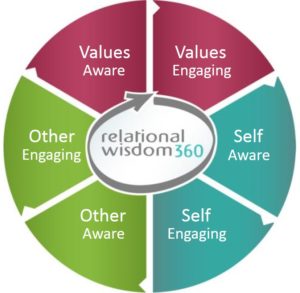
Our background in conflict resolution was helpful (both Corlette and I have written books on peacemaking), but we realized it would be far better to prevent conflict than it would be to spend hours resolving it. So we started searching for resources that would help our entire family develop relational skills that would enable us to “get upstream of conflict.”
Emotional Intelligence Provides Valuable Insights
During our search, we came across several books on “emotional intelligence,” also known as “EI” or “EQ” (for emotional quotient). EI is typically defined as the ability to identify, assess and manage the emotions of oneself, of others and of groups.
This concept originated in psychology circles in 1920 but did not gain wide attention until Daniel Goleman’s book, Emotional Intelligence, made the New York Times Best Seller List in 1995. Goleman describes EI as being made up of four core skills: self-awareness, self-management, social-awareness and relationship-management.
Thousands of studies have shown that improving EI yields a wide variety of benefits in a work setting, including increased productivity and team cohesiveness, better balance between work and family life, less conflict, reduced staff turnover, higher customer satisfaction and increased impact and profitability.
As a result, EI is now being taught in multinational corporations, medical and business schools, grade schools (as “social/emotional learning”), universities, seminaries, law enforcement and military academies, and even on NFL sports teams (see 100+ sample articles).
I have read many of the books on emotional intelligence and have found them to provide valuable insights into the neurology and hormonology that drive human relationships. As a result, I’ve found these books to provide valuable insights that I’ve applied at home, as a professional mediator and as a Certified EI Instructor.
The Dark Side of EI
Unfortunately, EI has some significant deficiencies. As a growing number of articles indicate, high levels of emotional intelligence can actually contribute to several relational problems, including:
- Over analyzing people and situations, which can become emotional exhausting and paralyze decision making
- Excessive self-criticism
- An inclination to agree to questionable actions out of sympathy or excessive sensitivity to others’ emotions
- Using emotions to side step questions and critical thinking by others
- Difficulty shifting our focus from single individuals and relating effectively to groups of people
But there are even deeper problems.
First, since traditional teaching on EI lacks a specific value system, people are free to use these skills in any way they want. This leaves them open to the temptation to manipulate others, either intentionally or unintentionally, for their own advantage (often referred to as “the dark side of EI“).
Second, since the primary motivation for improving EI is usually personal advancement (e.g., job promotions or increasing income), these relational skills can easily be used for selfish reasons rather than the good of others, which can lead to conflicting agendas and strained relationships and fragmented teams.
Relational Wisdom Surpasses Emotional Intelligence
Believing that relational skills should always be used in mutually beneficial ways, Corlette and I decided to develop a value-based form of emotional intelligence. We call it “relational wisdom” or “RW” for short. This paradigm captures all of the proven benefits of traditional EI while addressing its typical deficiencies.
The key principles of relational wisdom may be organized in terms of six core skills or disciplines that are grouped into three pairs. One pair focuses on how we how we live out our values, another on how we relate to ourselves, and the third on how we relate to others.
Each of these three pairs has an awareness component (what we see and understand), and an engaging component (what we do and say). These skill sets may be described in the following terms:
Values-awareness (remember) is your ability to honestly identify your true personal values.
- Values-engagement (faithfulness) is your ability to consistently apply your values in real life.
- Self-awareness (humility) is the ability to accurately discern your own emotions, thoughts, values, interests and abilities.
- Self-engagement (discipline) is the ability to manage your thoughts, emotions, words and actions constructively.
- Other-awareness (compassion) is the ability to understand and empathize with the experiences, emotions, values and interests of others.
- Other-engagement (service) is the ability to love, encourage, serve and resolve differences with others in a mutually beneficial way.
These skills have the potential to impact every area of life. In addition to improving workplace performance and advancement, they can deepen friendships, enhance marital intimacy and reduce the tensions inherent to raising and educating our children.
Reducing Parental Guilt and Regrets
Corlette and I found that one of the greatest benefits of developing better relational wisdom was that it helped us to avoid being “hijacked” by our emotions when our children aggravated us and we were tempted to say things we would later regret (see Four Ways to Defeat Hijacking). RW also improved our ability to ask engaging questions instead of lecturing our children (see Spanglish) and to respond with compassion instead of judgment when they made foolish choices (see The Compassionate Boxer).
Raising Empathetic Children Who Are Ready for the Workforce
One of our greatest joys today is seeing how our children are applying the principles of relational wisdom in their own lives and passing them on as they seek to develop both affective and cognitive empathy in their own children (see Raising Empathetic Children).
These skills are also valuable as our children enter the workforce, compete for jobs and learn how to work with other people. Why? Because modern corporations have learned that the value of an employee depends on both technical (hard) skills and relational (soft) skills.
In fact, every employee’s soft skills have the power to magnify—or diminish—the value of not only their own hard skills but also those of the people with whom they are working.
For example, if one member of a team is arrogant, insensitive, or insecure, and tends to discount or criticize others’ accomplishments or ideas, the cohesiveness and creativity of an entire team can be undermined (10 x 0 = 0).
Corporations are increasingly aware of this dynamic and are putting a higher value on soft skills like emotional intelligence. This is why I constantly tell young adults, “Earn good grades, because they will get you the job interview. But also develop good relational skills, because they will get you the job … and the promotions … and the higher salary.”
Preparing Our Children for Life
If we educate our children to obtain high SAT and ACT scores but fail to equip them with values-based relational skills, we are not preparing them to thrive in their friendships, marriages and careers.
If you’d like to equip the children in your life with both academic and relational skills, there are three ways you can begin doing so today.
First, click on the links provided above and read the articles and blog posts as a family or educational team over the next two weeks, sharing ideas and setting goals on how you can apply these principles in your home or school.
Second, subscribe to our weekly RW Blog and use the teachings and video clips to trigger meal time discussions and classroom assignments throughout the school year.
Third, download the RW360 Smartphone App for yourself and your older children (details here) so you can easily review and share these concepts as you interact with one another and other people in daily life.
Fourth, enroll your entire family or ministry team in our new online Exploring Relational Wisdom 3.0 Course. If you’d like to do this training as a family, you can email Jeff@rw360.org to request a special 50% discount code for your children.
These investments in relational training could make your school year far more enjoyable and productive … and set your children up for happy marriages, rewarding careers, and a life that serves as an inspiring example to others.
– Ken Sande
Reflection Questions:
- What are young people learning from entertainment channels and social media about how to build and preserve relationships?
- What are some of the relational skills you’d like to see the young people in your life develop more fully? How would their lives be different if they learn how to live out these skills in daily life?
- Are you in a position to promote or teach principles of relational wisdom to any children in your family, school or community? If so, make this one of your highest priorities for the coming year!
Permission to distribute: Please feel free to download, print, or electronically share this message in its entirety for non-commercial purposes with as many people as you like.
© 2016 Ken Sande
Would you like to receive future posts like this? Subscribe now!


 Values-awareness (remember) is your ability to honestly identify your true personal values.
Values-awareness (remember) is your ability to honestly identify your true personal values.



